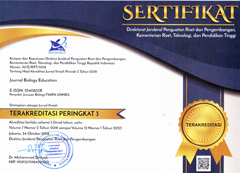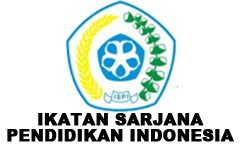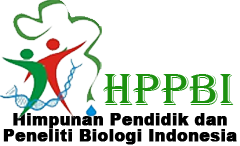PENGARUH PENERAPAN STRATEGI DIVERGENT THINKING TERHADAP KREATIVITAS SISWA
Abstract
The aim of this research was to examined the effect of the divergent thinking learning strategy on student’s creativity of environmental pollution and waste recycling at SMA N 1 Ambarawa. This research was a quasi experimental design with pre-test and post-test control group design which was applied on X-3 as control group and X-5 as experimental group. Sample was collected by a cluster random sampling. Data of the implementation of divergent thinking strategy, the creativity process, and student’s activity were collected by observation. Test was used to collect data of student’s creativity. T-test of student’s creativity enhancement also indicated a significant difference. Regression test showed the number of sig. 0,007<0,05 with ? = 3,512 + 0,064X and 0,219 for determination coefficient. The inference of this research was the divergent thinking strategy had a possitive effect on student’s creativity, so the student’s creativity of experimental group was better than the control one. The usage of divergent thinking brought an effect on student’s creativity (21,9%).
Penelitian ini bertujuan untuk menguji pengaruh pembelajaran yang diselenggarakan dengan menerapkan strategi divergent thinking terhadap kreativitas siswa pada materi pencemaran lingkungan dan daur ulang limbah di SMA N 1 Ambarawa. Penelitian ini merupakan penelitian quasi eksperimental design dengan pola pre-test and post-test control group design dan diterapkan pada kelas X3 sebagai kelas kontrol dan X5 sebagai kelas eksperimen. Pengambilan sampel secara cluster random sampling. Data pelaksanaan strategi divergent thinking oleh siswa dalam pembelajaran, proses kreatif, dan aktivitas siswa diperoleh melalui observasi. Tes digunakan untuk mengumpulkan data kreativitas siswa. Hasil uji t post-test menunjukkan perbedaan yang nyata dari kedua kelompok. Hasil yang signifikan juga ditunjukkan dalam uji t peningkatan kreativitas siswa. Hasil uji regresi menunjukkan angka sig. 0,007<0,05 dengan persamaan regresi ? = 3,512 + 0,064X dan koefisien determinasi dengan harga 0,219. Simpulan penelitian ini bahwa strategi divergent thinking berpengaruh positif terhadap kreativitas siswa, sehingga kreativitas siswa kelas eksperimen lebih baik daripada kelas kontrol. Penggunaan strategi divegent thinking memberikan pengaruh sebesar 21,9% terhadap kreativitas siswa.
References
Agusyana Y. 2011. Olah Data Skripsi dan Penelitian dengan SPSS 19. Jakarta: Gramedia.
Arnyana IBP. 2006. Pengaruh penerapan strategi pembelajaran inovatif pada pembelajaran biologi terhadap kemampuan berpikir kreatif siswa SMA. Jurnal Pendidikan dan Pengajaran IKIP Negeri Singaraja. 3(39): 496-515.
Baer J. 1993. Creativity and Divergent Thinking. New Jersey: LEA (Laurance Erlbaum Associates).
Carin AA. & BR Sund. 1989. Teaching Science through Discovery. Colombus Ohio: Merrill Publishing Company.
Cooperrider B. 2008. The importance of divergent thinking in engineering design disampaikan pada American Society for Engineering Education Pacific Southwest Annual Conference. Northern Arizona University 1-9 2008.
Hommel B & Prinz W. 1997. Theoretical issues in stimulus-response compatibility: editors introduction. Online at http://www.bernhard-hommel.edu/Introduction97.pdf [diakses tanggal 13 September 2012].
Huang CC, Chang CY, Li TY, & Wang HC. 2008. A collaborative support tool for divergent thinking: idea storming cube. National Research Association for Science Teaching: 1-6.
Johnson EB. 2002. Contextual Teaching Learning. California: Corwin Press.
Mariati. 2006. Pengembangan kreativitas siswa melalui pertanyaan divergen pada mata pelajaran llmu pengetahuan alam (IPA) Jurnal Pendidikan dan Kebudayaan. 63(12): 759-773.
Poerwadarminta WJS. 1994. Kamus Umum Bahasa Indonesia. Jakarta: PN Balai Pustaka.
Purwanto. 2008. Kreativitas berpikir menurut Guilford. Jurnal Pendidikan dan Kebudayaan. 27(14): 856-867.
Rifai A & Anni CT. 2009. Psikologi Pendidikan. Semarang: UNNES Press.
Runco MA. 2001. Flexibility and oryginality in childrens divergent thinking. The Journal of Psychology. 120(4): 345-352.
Silvia PJ, Winterstein BP, Willse JT, Barona CM, Cram JT, Hess KI Martinez JL, & Richard CA. 2008. Assessing creativity with divergent thinking tasks: exploring the reliability and validity of new subjective scoring methods. The American Psychological Association. 2(2): 68-85.
Subali B. 2009. Pengembangan tes pengukur keterampilan proses sains pola divergen mata pelajaran Biologi SMA disampaikan pada Seminar Nasional Biologi. UNY 581-593 4 Juli 2009.
The copyright of the article once it is accepted for publication shall be assigned to the journal as the publisher. The intended copyright includes the right to publish the article in various forms (including reprints). The journal maintains the publishing rights to the published articles.
This work is licensed under a Creative Commons Attribution 4.0 International License.







